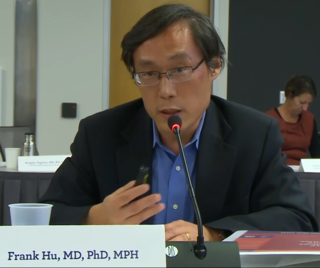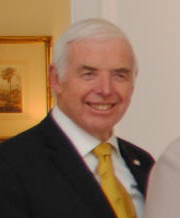
A carbohydrate is a biomolecule consisting of carbon (C), hydrogen (H) and oxygen (O) atoms, usually with a hydrogen–oxygen atom ratio of 2:1 and thus with the empirical formula Cm(H2O)n, which does not mean the H has covalent bonds with O. However, not all carbohydrates conform to this precise stoichiometric definition, nor are all chemicals that do conform to this definition automatically classified as carbohydrates.

Low-carbohydrate diets restrict carbohydrate consumption relative to the average diet. Foods high in carbohydrates are limited, and replaced with foods containing a higher percentage of fat and protein, as well as low carbohydrate foods.

A healthy diet is a diet that maintains or improves overall health. A healthy diet provides the body with essential nutrition: fluid, macronutrients such as protein, micronutrients such as vitamins, and adequate fibre and food energy.
Sir Albert William Liley was a New Zealand medical practitioner, renowned for developing techniques to improve the health of foetuses in utero.
A diabetic diet is a diet that is used by people with diabetes mellitus or high blood sugar to minimize symptoms and dangerous complications of long-term elevations in blood sugar.
David Francis Gerrard is a sports administrator, sports medicine specialist, and former Olympic Games swimming representative from New Zealand.

Gary Taubes is an American journalist, writer, and low-carbohydrate / high-fat (LCHF) diet advocate. His central claim is that carbohydrates, especially sugar and high-fructose corn syrup, overstimulate the secretion of insulin, causing the body to store fat in fat cells and the liver, and that it is primarily a high level of dietary carbohydrate consumption that accounts for obesity and other metabolic syndrome conditions. He is the author of Nobel Dreams (1987); Bad Science: The Short Life and Weird Times of Cold Fusion (1993); Good Calories, Bad Calories (2007), titled The Diet Delusion (2008) in the UK and Australia; Why We Get Fat: And What to Do About It (2010); The Case Against Sugar (2016); and The Case for Keto: Rethinking Weight Control and the Science and Practice of Low-Carb/High-Fat Eating (2020). Taubes's work often goes against accepted scientific, governmental, and popular tenets such as that obesity is caused by eating too much and exercising too little and that excessive consumption of fat, especially saturated fat in animal products, leads to cardiovascular disease.

The Western pattern diet is a modern dietary pattern that is generally characterized by high intakes of pre-packaged foods, refined grains, red meat, processed meat, high-sugar drinks, candy and sweets, fried foods, industrially produced animal products, butter and other high-fat dairy products, eggs, potatoes, corn, and low intakes of fruits, vegetables, whole grains, pasture-raised animal products, fish, nuts, and seeds.
The Marsden Medal is a yearly award given by the New Zealand Association of Scientists. It is named after Sir Ernest Marsden and honours "a lifetime of outstanding service to the cause or profession of science, in recognition of service rendered to the cause or profession of science in the widest connotation of the phrase." It rivals the Rutherford Medal from the Royal Society of New Zealand.
Muriel Emma Bell was a New Zealand nutritionist and medical researcher.

Added sugars or free sugars are sugar carbohydrates added to food and beverages at some point before their consumption. These include added carbohydrates, and more broadly, sugars naturally present in honey, syrup, fruit juices and fruit juice concentrates. They can take multiple chemical forms, including sucrose, glucose (dextrose), and fructose.

Frank B. Hu is a Chinese American nutrition and diabetes researcher. He is Chair of the Department of Nutrition and the Fredrick J. Stare Professor of Nutrition and Epidemiology at the Harvard T.H. Chan School of Public Health, and Professor of Medicine at the Harvard Medical School.

Sir Eion Sinclair Edgar was a New Zealand businessman and philanthropist. He was the chairman of Forsyth Barr Group, a major investment company based in Dunedin, for 20 years until his retirement in 2018, and was chancellor of the University of Otago between 1999 and 2003.
Hallie Ruth Buckley is a New Zealand bioarchaeologist and professor at the University of Otago.
Rachael Waring Taylor is a New Zealand childhood nutrition academic. She is currently a full professor at the University of Otago.
Matire Louise Ngarongoa Harwood is a New Zealand clinical researcher and trainee general practitioner. She is an associate professor at the University of Auckland. Harwood was the 2017 New Zealand L'Oréal UNESCO For Women in Science Fellow. Her expertise is in Māori health, focussed on reducing health inequity by improving indigenous health and well-being.
Marion Frances Robinson was a New Zealand nutritionist and physiologist. She was professor of nutrition at the University of Otago, and is particularly noted for her investigation of the importance of selenium in the human diet.

Atholl John Anderson is a New Zealand archaeologist who has worked extensively in New Zealand and the Pacific. His work is notable for its syntheses of history, biology, ethnography and archaeological evidence. He made a major contribution to the evidence given by the iwi (tribe) Ngāi Tahu to the Waitangi Tribunal.

Healthier Lives – He Oranga Hauora is one of New Zealand's eleven collaborative research programmes known as National Science Challenges. Running from 2015 to 2024, the focus of Healthier Lives National Science Challenge research is cancer, cardiovascular disease, obesity, and diabetes in the New Zealand population, encompassing prevention, treatment, and reducing health inequity, and including precision medicine techniques, and culturally-centred health programmes for Māori and Pasifika.

Lisa Anne Te Morenga is a New Zealand Maori academic, and she is a full professor at the Research Centre for Hauora and Health at Massey University. Her research focuses on nutrition and Māori health, especially in relation to dietary interventions to prevent metabolic disease.











